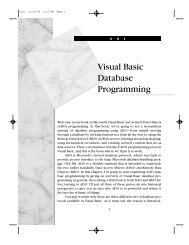SOCIAL PROBLEMS: A Down-to-Earth Approach, 8/e
SOCIAL PROBLEMS: A Down-to-Earth Approach, 8/e
SOCIAL PROBLEMS: A Down-to-Earth Approach, 8/e
You also want an ePaper? Increase the reach of your titles
YUMPU automatically turns print PDFs into web optimized ePapers that Google loves.
TABLE 1-3 Should Abortion Be Legal or Illegal?<br />
This question was asked of a representative sample of Americans:<br />
“Do you think abortions should be legal under any circumstances, legal only under certain<br />
circumstances, or illegal in all circumstances?”<br />
National 24% 56% 19%<br />
Sex<br />
Male 19% 62% 18%<br />
Female 28% 51% 20%<br />
Race<br />
White 24% 58% 17%<br />
Nonwhite 23% 50% 25%<br />
Black 25% 42% 31%<br />
Age<br />
18–29 years 29% 50% 21%<br />
30–49 years 24% 56% 19%<br />
50–64 years 22% 60% 17%<br />
50 years and older 21% 59% 19%<br />
65 years and older 19% 58% 22%<br />
Education<br />
College postgraduate 36% 55% 9%<br />
College graduate 30% 61% 9%<br />
Some college 28% 53% 17%<br />
High school graduate or less 14% 58% 27%<br />
Income<br />
$75,000 and over 33% 56% 10%<br />
$50,000–$74,999 26% 54% 20%<br />
$30,000–$49,999 24% 56% 20%<br />
$20,000–$29,999 16% 65% 19%<br />
Under $20,000 13% 54% 33%<br />
Community<br />
Urban area 30% 52% 17%<br />
Suburban area 24% 57% 18%<br />
Rural area 16% 59% 24%<br />
Region<br />
East 29% 54% 16%<br />
Midwest 19% 62% 17%<br />
South 16% 58% 24%<br />
West 35% 49% 16%<br />
Politics<br />
Republican 12% 65% 23%<br />
Democrat 35% 47% 17%<br />
Independent 23% 58% 17%<br />
Note: Because of rounding, rows do not always add <strong>to</strong> 100%.<br />
Source: Table 2.101 of Sourcebook of Criminal Justice Statistics, 2005.<br />
LEGAL<br />
ALWAYS UNDER CERTAIN NEVER<br />
LEGAL CIRCUMSTANCES LEGAL<br />
These five tasks are much more easily listed than performed. Although sociologists gather<br />
extensive information on social problems, making accurate predictions from those data is<br />
difficult. People often change their behaviors, which can throw off the best predictions of<br />
social scientists. Sociology, however, is especially useful for clarifying issues in social problems.<br />
Clarification, of course, requires facts. This, in turn, leads <strong>to</strong> the question of how sociologists<br />
get dependable information. Why don’t they simply depend on common sense?<br />
THE ROLE OF SOCIOLOGY IN <strong>SOCIAL</strong> <strong>PROBLEMS</strong> 15
















